
 *** “Working: A Musical—Localized” is loosely based on the 1974 book of the same name by Studs Terkel. Originally produced for the stage in 1977 and later adapted in 1982 by Stephen Schwartz and Nina Faso, today’s show, directed by Erin Ortman, has been updated for the year 2024. What makes the performance a joy to watch is the combination of singing, dancing, and acting—and all the strong language only adds to the characters’ authenticity. Fourteen poignant yet relatively cheery songs about work and the workplace teach the audience about the people who perform various jobs in America, many of which can be a drudge or a challenge. But what makes this production of “Working: A Musical” memorable is the input of students at Northwestern University as well as the incorporation of recorded interviews of real people into the presentation. Specifically, we learn about the work and life experiences of six Evanston residents: Jorge L. Silva, Joe Salgato, Dr. Mark Watson, James Mahoney, Anita Dobobrov, and Mac Do. Their interviews, conducted by Rasheed Peters, provide actual examples of individuals’ hopes, dreams, and struggles and what it means to work whatever jobs you can get.
*** “Working: A Musical—Localized” is loosely based on the 1974 book of the same name by Studs Terkel. Originally produced for the stage in 1977 and later adapted in 1982 by Stephen Schwartz and Nina Faso, today’s show, directed by Erin Ortman, has been updated for the year 2024. What makes the performance a joy to watch is the combination of singing, dancing, and acting—and all the strong language only adds to the characters’ authenticity. Fourteen poignant yet relatively cheery songs about work and the workplace teach the audience about the people who perform various jobs in America, many of which can be a drudge or a challenge. But what makes this production of “Working: A Musical” memorable is the input of students at Northwestern University as well as the incorporation of recorded interviews of real people into the presentation. Specifically, we learn about the work and life experiences of six Evanston residents: Jorge L. Silva, Joe Salgato, Dr. Mark Watson, James Mahoney, Anita Dobobrov, and Mac Do. Their interviews, conducted by Rasheed Peters, provide actual examples of individuals’ hopes, dreams, and struggles and what it means to work whatever jobs you can get.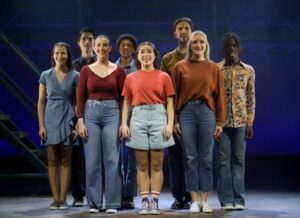
But the introduction of the recorded interviews is not entirely successful. Despite the fact that the documentary film footage adds a meaningful dimension to the story of work today, it’s now as if two different sets of stories are being told at the same time. The first set of narratives have to do with the musical and what the characters exhibit on stage, whereas the second set takes the form of a documentary of real life people whose interviews are, from time to time, being projected over the stage. The problem is that the clash of two very different genres (that is, the musical genre and the documentary genre) makes things much too choppy. One becomes a distraction from the other.
To spell things out, Terkel’s book containing original accounts of workers is non-fiction, and Peters’ recorded interviews with Evanstonians is also non-fiction. But a musical by nature contains fictional or invented characters even if the script is based on real people—and unless we’re dealing with a jukebox musical, there is usually some plot or thread to tie the entire storyline together. Adding real-life interviews throughout the performance of “Working” unfortunately throws off the balance between the lighthearted and serious aspects of the musical, moving the needle towards the serious—and also serves to break the storyline’s thread. When the projections alter the show’s rhythm and interrupt its flow, we in the audience are almost forced to compare the fictionalized characters on stage with the actual people in the recorded interviews. This makes the characters in the musical appear more hollow than real; because, after all, they are largely composites of real people. Moreover, the characters are further demeaned when the actors stare upward at the various screens whenever the set would go dark. As the believability of those who are singing, dancing, and acting becomes compromised in favor of those featured in the documentary, the salience of the musical portion of the program begins to vanish together with much of its relevance. What we are left with, therefore, is a series of seemingly disconnected vignettes about people doing their jobs, with much of the underlying story being lost.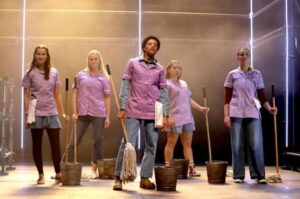
The acting company consists of Adeyemi Attobra, Elena García, Isadora Coco Gonzalez, Luke Mott, Jordan Muhammad, Tallulah Nouss (Dance Captain), Lily Ramras, Oliver Tam, and Paige Klemenhagen (Swing).* Exceptional is music director Eric Powers, who is also the conductor of the orchestra and who plays keyboard 1. Other instrumentalists include Selina Liu (keyboard 2), Cece Olszewski (violin), Kieran Cullen (cello), Adebe Karem (guitar), Austin Aldrich (bass), and Nick Landon (drums/percussion). Breon Arzell has done a fine job with the choreography; it is entertaining and fun. Minimalist set design by Milo Bue allows the audience to stretch our collective imagination, as a number of industrial-looking steel staircases and a black background works well in prompting various settings. Prop design is also minimalist and clever. One of my favorite scenes has to do with truckers sitting on rolling tables with the flashlights attached to them and being wheeled around by others to the song “Brother Trucker” written by James Taylor. Another wonderful song includes the trio of Adeyemi Attobra, Oliver Tam, and Luke Mott singing the song “Father and Son”, a Stephen Schwartz creation. Incidentally, Mott has a voice reminiscent of John Denver; I felt he could cut an album right then and there. Lighting design by Seojung Jang is superior. I loved the strips of long thin white LED lights forming cubicles and seeing various colors of LEDs defining rooms—and themes. The lighting works extremely well especially towards the end (with the turquoise and gold and the spotlights on the different characters). Costumes by Lia Wallfish are fitting, and sound design by Brandon Reed is nicely done.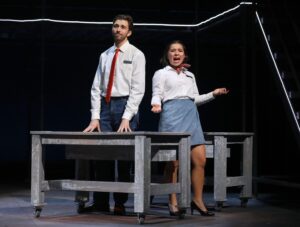
I didn’t care for the projection design, however. There were the moments when some of the interviewees’ faces were almost frozen while we heard them speaking in the background. If there was some problem with the original camerawork, then this portion of the interview should have been cut entirely or done over again. Perhaps adding some type of B-roll or animation might have been a better choice than pasting almost still pictures of interviewees’ faces. I also found the timing of the projections to be somewhat problematic, which added to the unevenness of the presentation. In my opinion, the show would have been much better had it started out with a separate and complete documentary film of real people in Evanston relating their modern-day work experiences. This could have morphed uninterrupted into the musical itself.
This multimedia production is chock full of intriguing personal accounts. We see what people need to do what they need to do to make a living and get by—and it’s far from being a rosy situation. This musical is more about work as being a means to an end (financial or otherwise) and as a means for structuring one’s day, as compared to work being a means of striving for excellence in one’s craft. (And here we’re talking about honest labor; a story about illegal activity would be very different.) Note that the show is not meant to be a comprehensive study about paid and unpaid work and all the ways that people try to earn a living. One important thing that the recorded interviews do is that they point to the various aspects of personality, background, and skill that people typically bring to the table when they look for a job and try to keep it, separate from the nature of the job itself. In all, personal circumstances often determine the types of jobs individuals are willing to take and how desperate they may be for an income—and how much of the everyday grind they are willing to accept and endure. We also come to understand work as being part of the life cycle—together with likely regrets about some of the choices we have made. The bottom line is that working largely means that you have to do what you have to do. And then, you must ask yourself, “Did I make the right choices in life?”
“Working: A Musical – Localized” is playing through February 11, 2024, at Northwestern University’s Josephine Louis Theater, 20 Arts Circle Drive, located in the Wirtz Center on the Evanston, Illinois campus.
Tickets:
General Public – $30
Senior Citizens – $27
NU Faculty Staff – $25
Full-Time Students – $12
Full-Time NU Students – $8 in advance, $12 at the door
A per ticket service charge will be added to all online ($3 per ticket) and phone ($2 per ticket) purchases
There are seven performances only.
Performance schedule:
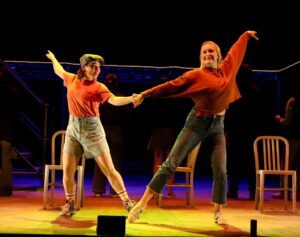 Friday, 2/2 at 7:30 p.m.
Friday, 2/2 at 7:30 p.m.
Saturday, 2/3 at 7:30 p.m.
Sunday, 2/4 at 2 p.m.
Thursday, 2/8 at 7:30 p.m.*
Friday, 2/9 at 7:30 p.m.
Saturday, 2/10 at 7:30 p.m.
Sunday, 2/11 at 2 p.m.
*Join Director Erin Ortman, Assistant Dean & Wirtz Center Executive Artistic Director Tanya Palmer, and the “Working” cast for a talkback following the February 8th performance.
For more information, visit: https://wirtz.northwestern.edu/working-a-musical/.
To purchase tickets, go to: https://ci.ovationtix.com/1771/production/1171094 or phone The Wirtz Center Box Office at 847-491-7282 or visit the box office in person.
The Wirtz Center Box Office is located in the Barber Theater lobby at 30 Arts Circle Drive.
For questions, email their audience service team at wirtz@northwestern.edu or call 847-491-7282.
Masks Recommended, No Longer Required
*My guest told me afterwards that she did not care for the fact that men often played women and women often played men. She called it being “super-politically correct.” “Call me old-fashioned,” she added.” “I found it confusing.”
To see what others are saying, visit www.theatreinchicago.com, go to Review Round-Up and click at “Working: A Musical-Localized”.





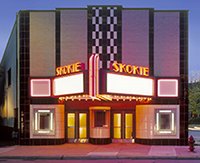
More Stories
“Dummy in Diaspora”
“The Magic School Bus: Lost in the Solar System”
“February House” reviewed by Julia W. Rath